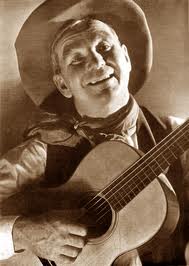Harry McClintock
| Harry McClintock | |
|---|---|
 | |
| Born |
October 8, 1882 Knoxville, Tennessee |
| Died |
April 24, 1957 (aged 74) San Francisco, Calif. |
| Other names | Haywire Mac, Radio Mac, Strawlegs Martin |
| Occupation | boomer, author, poet, busker, cowboy, union organizer |
| Known for | "Big Rock Candy Mountain", "Hallelujah, I'm a Bum" |
Harry Kirby McClintock (October 8, 1882 – April 24, 1957), also known as "Haywire Mac," was an American singer and poet.
Life
Born in Knoxville, Tennessee, "the son of a railroad cabinet maker and nephew of four boomer trainmen". His drifting began when he ran away from home as a boy to join a circus. He railroaded in Africa, worked as a seaman, saw action in the Philippines as a civilian mule-train packer, supplying American troops with food and ammunition, and in 1899 found himself in China as an aide to newsmen covering the Boxer Rebellion. Back in the States, he hired out to the Pittsburgh, Fort Wayne and Chicago Railway in the Pittsburgh area, and from there he took the boomer trail as railroader and a minstrel. Mac lived an adventurous life and never lost his sense of humor".[1]
Music
He is best known for his song "Big Rock Candy Mountain", much later featured in the 2000 movie O Brother, Where Art Thou?. The song reached No. 1 on Billboard's "Hillbilly Hits" chart in 1939. Having worked as a cowboy himself, McClintock was one of the few "country" singers who had an authentic background from which to draw.
His song "The Old Chisholm Trail" was featured in the end credits of The Grandest Enterprise Under God episode (Episode 5) of the TV documentary miniseries The West.
He was included in Robert Crumb's series of "Heroes of Blues, Jazz and Country" trading cards.
Politics
He is credited as being the first person to sing "The Preacher and the Slave", a song by Joe Hill, in public. He was a lifelong member of the Industrial Workers of the World. In the early 1920s he worked and organized union men in the oil fields of west Texas, where he met and recruited writer Jim Thompson, who later incorporated him into several short stories using the name "Strawlegs Martin."[2]
Selected discography
78s
- Ain't we crazy? (Barefoot boy with boots on) (1928; Victor V-40101) [3]
- The Big Rock Candy Mountains (1928, Victor Talking Machine Co. Camden, NJ No. 21704-B) [4]
- Hallelujah! I'm a Bum (1928, "His Master's Voice", Victor label No. 21343-B (42137)). Reverse side is "The Bum Song".
LPs
- Haywire Mac (1950, Cook Records 01124)
- Haywire Mac (1972, Folkways Records 05272)
Compilations
- Songs to Grow On, Vol. 3: American Work Songs (1951, Folkways Records 07027). Track 4: "Jerry, Go and Oil That Car"
- Cowboy Songs on Folkways (1991, Smithsonian Folkways 40043). Track 7: "Utah Carl"
- Folk Song America, Vol. 1 (1991, Smithsonian Collection 461). Track 5: "Big Rock Candy Mountain"
- When I Was a Cowboy, Vol. 1 (1996, Yazoo Records 2022). Track 9: "Sam Bass"
- Train 45: Railroad Songs of the Early 1900s (1998, Rounder Select 1143). Track 20: "Jerry, Go Oil That Car"
- O Brother, Where Art Thou? (2000, Lost Highway Records 170069). Track 2: "Big Rock Candy Mountain"
- Back in the Saddle Again: American Cowboy Songs (2004, New World Records). Track 1: "Old Chisholm Trail"
Bibliography
Stories
- "Railroaders are Tough" (Railroad Magazine, April, 1943)
- "Boomer and Their Women" (Railroad Magazine, December, 1957)
Articles
- "New Publications - Railroad Songs of Yesteryear" (Railroad Magazine, August 1943) Short biography is part of review.
References
- ↑ "He's Gone to the Big Rock Candy Mountain", Railroad Magazine, Vol. 68 No. 6, Oct. 1957 p. 57
- ↑ Burnett, Jay. "Things Are Not As They Seem". The Penniless Press On-Line. Retrieved 21 May 2013.
- ↑ Victor Discography: Matrix BVE-46452. Ain't we crazy? / Radio Mac [i.e., Harry K. McClintock
- ↑ Victor Discography: Matrix BVE-46454. The big rock candy mountains / Mac [i.e., Harry K. McClintock
External links
Articles
- Harry McClintock biography
- Harry McClintock at AllMusic.
- Harry McClintock on KFRC Radio.
- Harry McClintock on Victor Records.
Sheet music
- The Bum Song: words and music by Harry McClintock.
Lyrics
Albums
- Harry McClintock: The Great American Bum
- Mac's Haywire Orchestra
- Harry McClintock Download PDF file of liner notes.
Streaming audio
- Big Rock Candy Mountain at the Internet Archive.
- Hallelujah, I'm a Bum on Songs of the Wobblies
- Two Harry McClintock songs in Swedish translation
- Works by or about Harry McClintock at Internet Archive
- Videos
- Ain't We Crazy on YouTube recorded by Harry McClintock.
- The Big Rock Candy Mountains on YouTube recorded by Harry McClintock.
- The Bum Song on YouTube recorded by Harry McClintock.
- The Old Chisholm Trail on YouTube recorded by Harry McClintock.
|